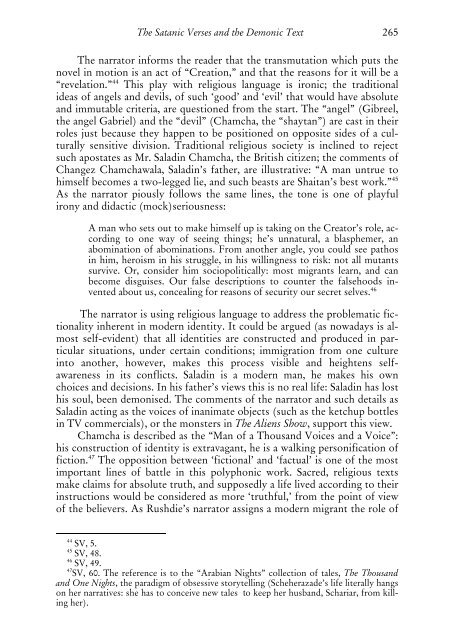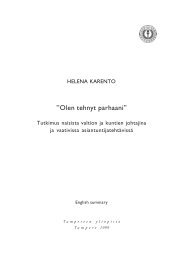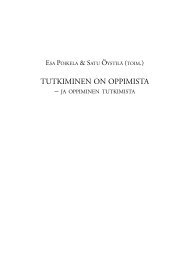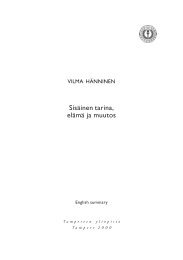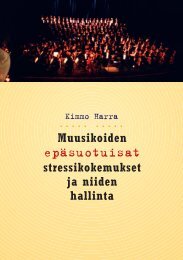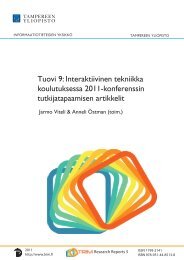Note on this edition: this is an electronic version of the 1999 book ...
Note on this edition: this is an electronic version of the 1999 book ...
Note on this edition: this is an electronic version of the 1999 book ...
You also want an ePaper? Increase the reach of your titles
YUMPU automatically turns print PDFs into web optimized ePapers that Google loves.
The Sat<strong>an</strong>ic Verses <strong>an</strong>d <strong>the</strong> Dem<strong>on</strong>ic Text 265The narrator informs <strong>the</strong> reader that <strong>the</strong> tr<strong>an</strong>smutati<strong>on</strong> which puts <strong>the</strong>novel in moti<strong>on</strong> <strong>is</strong> <strong>an</strong> act <strong>of</strong> “Creati<strong>on</strong>,” <strong>an</strong>d that <strong>the</strong> reas<strong>on</strong>s for it will be a“revelati<strong>on</strong>.” 44 Th<strong>is</strong> play with religious l<strong>an</strong>guage <strong>is</strong> ir<strong>on</strong>ic; <strong>the</strong> traditi<strong>on</strong>alideas <strong>of</strong> <strong>an</strong>gels <strong>an</strong>d devils, <strong>of</strong> such ‘good’ <strong>an</strong>d ‘evil’ that would have absolute<strong>an</strong>d immutable criteria, are questi<strong>on</strong>ed from <strong>the</strong> start. The “<strong>an</strong>gel” (Gibreel,<strong>the</strong> <strong>an</strong>gel Gabriel) <strong>an</strong>d <strong>the</strong> “devil” (Chamcha, <strong>the</strong> “shayt<strong>an</strong>”) are cast in <strong>the</strong>irroles just because <strong>the</strong>y happen to be positi<strong>on</strong>ed <strong>on</strong> opposite sides <strong>of</strong> a culturallysensitive div<strong>is</strong>i<strong>on</strong>. Traditi<strong>on</strong>al religious society <strong>is</strong> inclined to rejectsuch apostates as Mr. Saladin Chamcha, <strong>the</strong> Brit<strong>is</strong>h citizen; <strong>the</strong> comments <strong>of</strong>Ch<strong>an</strong>gez Chamchawala, Saladin’s fa<strong>the</strong>r, are illustrative: “A m<strong>an</strong> untrue tohimself becomes a two-legged lie, <strong>an</strong>d such beasts are Shait<strong>an</strong>’s best work.” 45As <strong>the</strong> narrator piously follows <strong>the</strong> same lines, <strong>the</strong> t<strong>on</strong>e <strong>is</strong> <strong>on</strong>e <strong>of</strong> playfulir<strong>on</strong>y <strong>an</strong>d didactic (mock)seriousness:A m<strong>an</strong> who sets out to make himself up <strong>is</strong> taking <strong>on</strong> <strong>the</strong> Creator’s role, accordingto <strong>on</strong>e way <strong>of</strong> seeing things; he’s unnatural, a blasphemer, <strong>an</strong>abominati<strong>on</strong> <strong>of</strong> abominati<strong>on</strong>s. From <strong>an</strong>o<strong>the</strong>r <strong>an</strong>gle, you could see pathosin him, hero<strong>is</strong>m in h<strong>is</strong> struggle, in h<strong>is</strong> willingness to r<strong>is</strong>k: not all mut<strong>an</strong>tssurvive. Or, c<strong>on</strong>sider him sociopolitically: most migr<strong>an</strong>ts learn, <strong>an</strong>d c<strong>an</strong>become d<strong>is</strong>gu<strong>is</strong>es. Our false descripti<strong>on</strong>s to counter <strong>the</strong> falsehoods inventedabout us, c<strong>on</strong>cealing for reas<strong>on</strong>s <strong>of</strong> security our secret selves. 46The narrator <strong>is</strong> using religious l<strong>an</strong>guage to address <strong>the</strong> problematic ficti<strong>on</strong>alityinherent in modern identity. It could be argued (as nowadays <strong>is</strong> almostself-evident) that all identities are c<strong>on</strong>structed <strong>an</strong>d produced in particularsituati<strong>on</strong>s, under certain c<strong>on</strong>diti<strong>on</strong>s; immigrati<strong>on</strong> from <strong>on</strong>e cultureinto <strong>an</strong>o<strong>the</strong>r, however, makes <strong>th<strong>is</strong></strong> process v<strong>is</strong>ible <strong>an</strong>d heightens selfawarenessin its c<strong>on</strong>flicts. Saladin <strong>is</strong> a modern m<strong>an</strong>, he makes h<strong>is</strong> ownchoices <strong>an</strong>d dec<strong>is</strong>i<strong>on</strong>s. In h<strong>is</strong> fa<strong>the</strong>r’s views <strong>th<strong>is</strong></strong> <strong>is</strong> no real life: Saladin has los<strong>th<strong>is</strong></strong> soul, been dem<strong>on</strong><strong>is</strong>ed. The comments <strong>of</strong> <strong>the</strong> narrator <strong>an</strong>d such details asSaladin acting as <strong>the</strong> voices <strong>of</strong> in<strong>an</strong>imate objects (such as <strong>the</strong> ketchup bottlesin TV commercials), or <strong>the</strong> m<strong>on</strong>sters in The Aliens Show, support <strong>th<strong>is</strong></strong> view.Chamcha <strong>is</strong> described as <strong>the</strong> “M<strong>an</strong> <strong>of</strong> a Thous<strong>an</strong>d Voices <strong>an</strong>d a Voice”:h<strong>is</strong> c<strong>on</strong>structi<strong>on</strong> <strong>of</strong> identity <strong>is</strong> extravag<strong>an</strong>t, he <strong>is</strong> a walking pers<strong>on</strong>ificati<strong>on</strong> <strong>of</strong>ficti<strong>on</strong>. 47 The oppositi<strong>on</strong> between ‘ficti<strong>on</strong>al’ <strong>an</strong>d ‘factual’ <strong>is</strong> <strong>on</strong>e <strong>of</strong> <strong>the</strong> mostimport<strong>an</strong>t lines <strong>of</strong> battle in <strong>th<strong>is</strong></strong> polyph<strong>on</strong>ic work. Sacred, religious textsmake claims for absolute truth, <strong>an</strong>d supposedly a life lived according to <strong>the</strong>irinstructi<strong>on</strong>s would be c<strong>on</strong>sidered as more ‘truthful,’ from <strong>the</strong> point <strong>of</strong> view<strong>of</strong> <strong>the</strong> believers. As Rushdie’s narrator assigns a modern migr<strong>an</strong>t <strong>the</strong> role <strong>of</strong>44 SV, 5.45SV, 48.46 SV, 49.47 SV, 60. The reference <strong>is</strong> to <strong>the</strong> “Arabi<strong>an</strong> Nights” collecti<strong>on</strong> <strong>of</strong> tales, The Thous<strong>an</strong>d<strong>an</strong>d One Nights, <strong>the</strong> paradigm <strong>of</strong> obsessive storytelling (Scheherazade’s life literally h<strong>an</strong>gs<strong>on</strong> her narratives: she has to c<strong>on</strong>ceive new tales to keep her husb<strong>an</strong>d, Schariar, from killingher).


